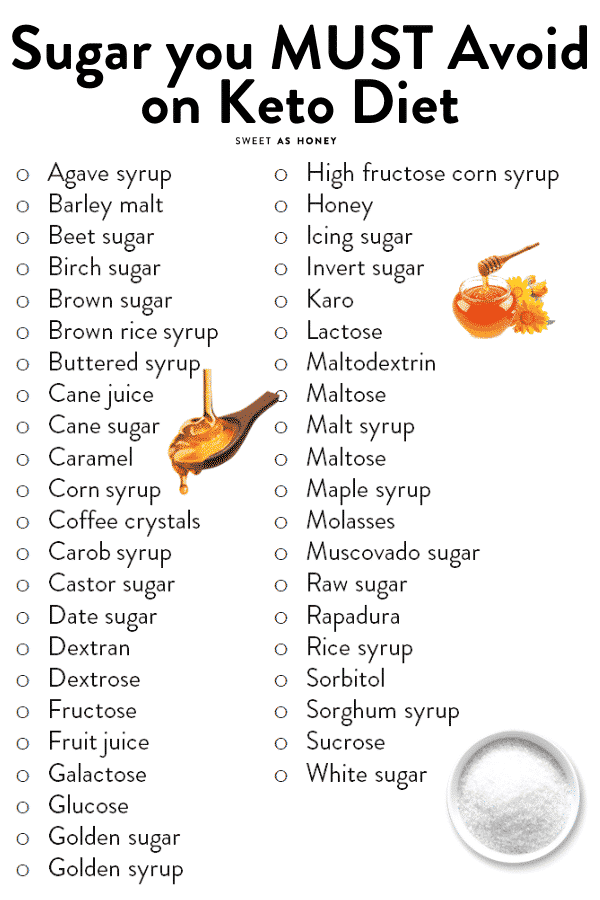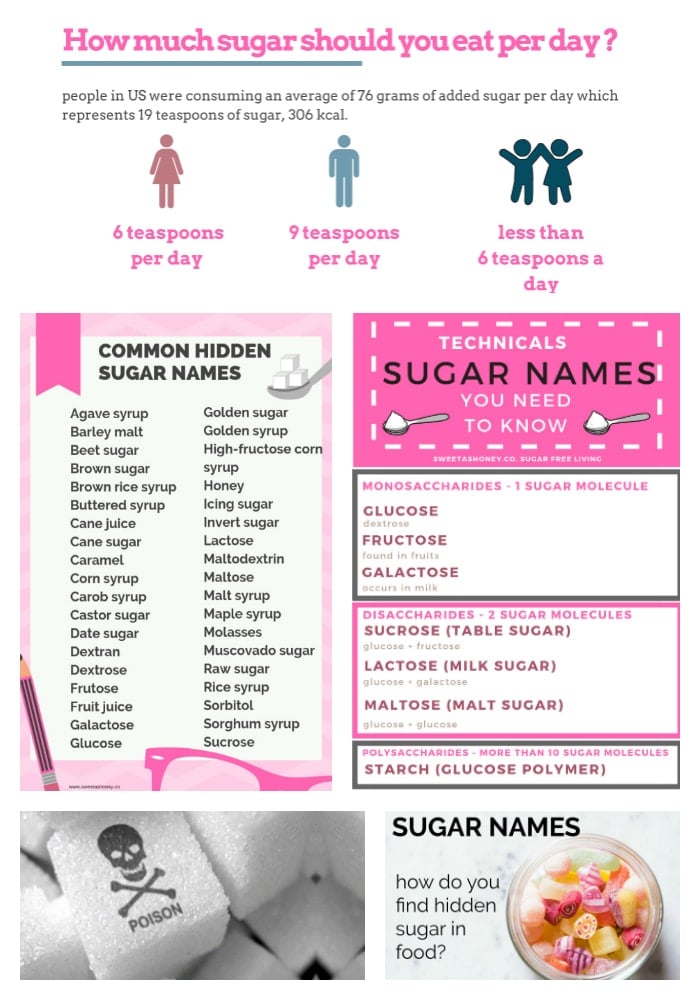Hidden Sugar Names to Avoid on a Keto Diet
This recipe may contain Amazon or other affiliate links. As an Amazon Associate I earn from qualifying purchases.
The Keto and all Low-Carb diets, in general, are all about reducing the intake of carbohydrates for the body to live off its fats. It can, however be quite tricky to identify all possible sources of sugar, in particular in processed food.
Because sugar may not simply be listed as sugar on the ingredients list of your favorite packaged food, these are what are called hidden sugars. On a keto diet, it is crucial to be able to identify these hidden sugars so you can stay clear of them!

What is sugar?
Sugar is the most dependence-creating carbohydrate we eat every day. Sugar is a carbohydrate, a macronutrient that fuels our body with energy as fat and protein. Carbohydrate is the preferred source of energy of our body on the traditional high-carb diet.
The body turns sugar into smaller glucose molecules to be used as energy by our brain, muscle, and organs. Fructose is the molecule that we should avoid as much as possible to decrease the effects of sugar on our metabolism.
It is important that you learn what is behind the word “sugar” to easily identify where it is in your food and how to avoid it.
Sugar definition
Sugar, also called sucrose – the chemical name of this disaccharide (other disaccharides are lactose and maltose) – is naturally produced by plants and therefore is found in fruits, vegetables, and even in some nuts. One molecule of sucrose is always made of two smaller molecules, one molecule of glucose and one molecule of fructose.
- Glucose – made by plants during photosynthesis. Glucose is the only form of energy that our cells can use as fuel. Our body can, however, turn other sugars as well as fat into glucose through a process called Gluconeogenesis – this is what is leveraged by the Keto diet.
- Fructose – Fructose is also made by plants as an alternative way of storing glucose. Fructose is often found in highly ripe vegetables like fruits or nuts. Our body is not designed to receive a high intake of fructose. Fructose acts differently in our bodies. It has a slower absorption rate than glucose, meaning that you don’t feel satisfied after eating fructose. That’s why we tend to overeat fructose-containing food, and when we do, our liver converts it into fat.
You now understand why eating ‘sugar’ or high fructose food leads to obesity, diabetes, or heart disease. Note that fructose from fruits or vegetables has a lower impact compared to liquid fructose from sweeteners or fructose added to soda drinks or processed food.
In fact, fruits are nutritionally dense and contain fiber, but they still add up to your daily sugar count, so they should be selected carefully to focus on low fructose fruit and low-carb vegetables.
There are three types of sugar.
Apart from white sugar (table sugar), you may have heard of three other sugar words listed below.
Monosaccharides (one sugar molecule)
- Glucose (or dextrose)
- Fructose (found in fruits)
- Galactose (occurs in milk)
Disaccharides (two monosaccharides)
- Sucrose (table sugar) = glucose + fructose
- Lactose (milk sugar) = glucose + galactose
- Maltose (malt sugar) = glucose + glucose
Polysaccharides (more than 10 sugar molecules)
- Starch (glucose polymer)
What is added sugar?
In our modern society, we consume two types of sugar:
- Natural Sugar – sugar naturally present in food like fruits (fructose) or milk (lactose)
- Added sugar – this includes any kind of sugar added to processed food (or beverages) during the production or preparation. Some added sugars are natural sugars, like cane sugar, white sugar, brown sugar, maple syrup, honey, and others are artificial sugars like high-fructose corn syrup.
The main product containing added sugar and the ones you should remove from your pantry and fridge right now are:
- Dairy desserts – ice cream and flavored yogurt
- Soft drinks – juices, sports drinks, energy drinks, and flavored water
- Candy and chocolate
- Sweet pastries and desserts – pies, rolls, pastries, brownies, doughnuts, cookies, and cakes
Sugar is a carbohydrate, a macronutrient that fuels our body with energy as fat and protein. Carbohydrate is the preferred source of energy of our body. It uses glucose molecules to create energy for our brain, muscle, and organs.
Common hidden sugar names
There are many sugar names on the food labels, and the list below will help you spot the most common hidden sugar names on your favorite store-bought food.
On a keto diet, if there are any of these sugar names listed on the ingredients list – don’t buy them. It means the product is very high in sugar and will impact your blood sugar level and ketosis.
Follow me on Instagram for more keto recipe inspiration, and ask me any questions to help you remove hidden sugar from your life!
XOXO Carine
Posted In:
Category:
ArticlesDisclaimer
The recipes, instructions, and articles on this website should not be taken or used as medical advice. The nutritional data provided on Sweetashoney is to be used as indicative only. The nutrition data is calculated using WP Recipe Maker. Net Carbs is calculated by removing the fiber and some sweeteners from the total Carbohydrates.
You should always calculate the nutritional data yourself instead of relying on Sweetashoney's data. Sweetashoney and its recipes and articles are not intended to cure, prevent, diagnose, or treat any disease. Sweetashoney cannot be liable for adverse reactions or any other outcome resulting from the use of recipes or advice found on the Website.


Share this post!
If you enjoyed this post, share it with your close ones!
Leave a comment
Hi Carine! I have decided to change my eating habits by starting to embrace the keto ‘diet’ ( the lifestyle change and not a ‘diet’, per se). I am overweight by 45lbs. and have intestinal problems (not Celiac or Crohn’s) and feeling not quite up to par. Admittedly, I am used to eating a poor diet (according to all the no-nos that I have read about the keto way of eating). Anyway, my question is: by trying to eliminate all sugar from my diet. I read the ingredients labels and most are filled with euphemisms for sugar and are easy to avoid. But … some things (such as canned chili, for example), has sugar listed somewhere in the middle of the ingredients list, and sometimes it can be found in the ‘less than 2%’ area. Will this (assumed) small (?) amount of sugar throw off my ‘diet’? I plan to stop eating processed junk like that. I don’t eat much junk foods and empty calories. Thanks beforehand. I am very impressed with your site and I’m glad I found it and will become a member. Thanks from Boise!!
Good morning, thanks for following my site. You should avoid any amount of added sugar on a low-carb keto diet especially the one in ready made food, often the worst as it’s low quality white sugar or liquid fructose that spike blood sugar level quickly. Focus on buying pure tomato sauce, ground beef and spices and make that chili at home ! I have plenty of recipe to help like this taco seasoning recipe to make your own Mexican flavoring at home without sugar! Enjoy the recipes around here. XOXO Carine